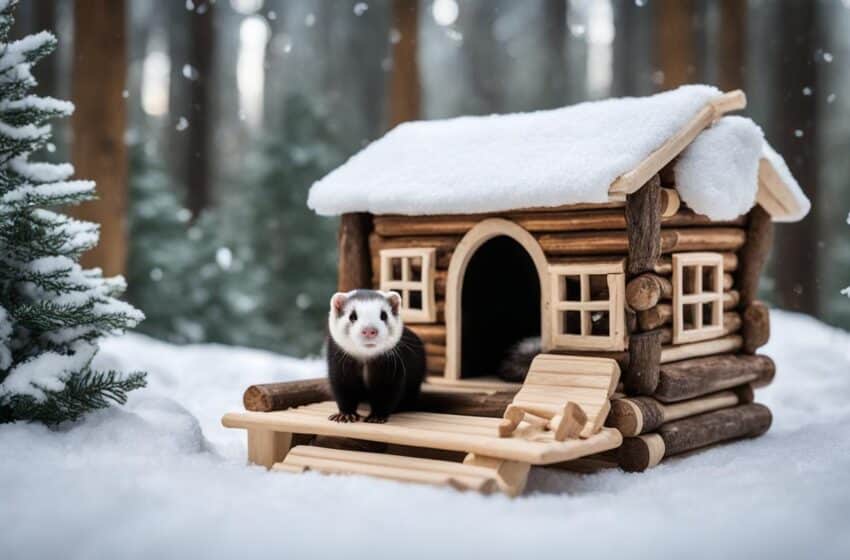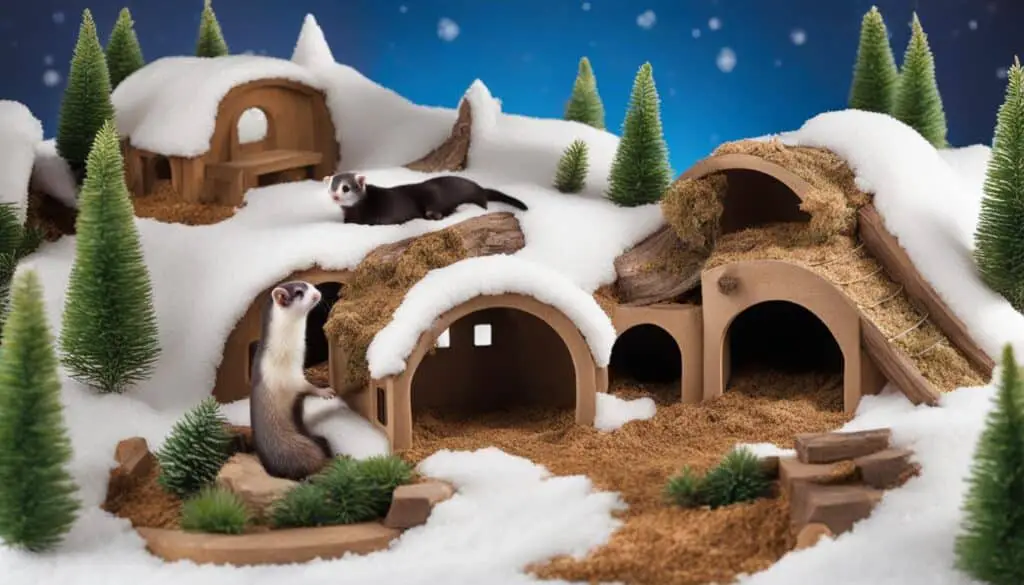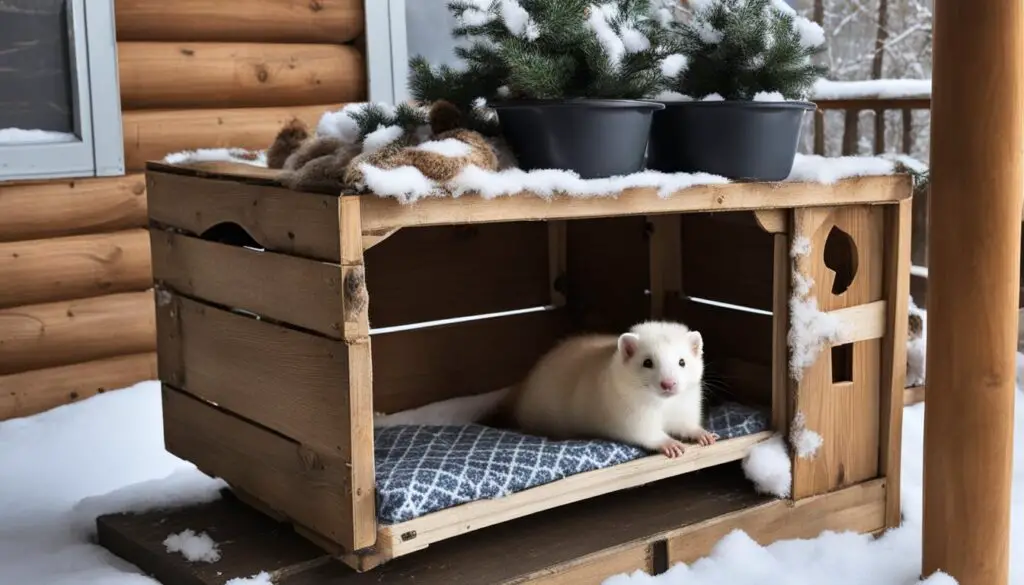Winter Housing Solutions for Ferrets

As the winter months approach, it’s crucial to ensure that our furry friends have a warm and safe housing environment. Ferrets are sensitive to cold temperatures, and providing them with suitable winter housing is essential for their well-being. In this article, I will share the best winter housing solutions for ferrets, along with ideal care tips to keep them warm and protected during the cold months.
Key Takeaways:
- Proper winter housing is crucial for keeping ferrets warm and safe during the colder months.
- Consider indoor housing options, such as a spacious cage with temperature control features, to create a cozy environment for your ferrets.
- If opting for outdoor housing, choose a well-insulated hutch with a dedicated shelter area and wind protection.
- DIY winter housing ideas using insulation materials and heating pads can be a cost-effective option for creative enthusiasts.
- Ensure the use of safe heating options with built-in temperature controls and actively monitor the temperature in the housing area.
Key Considerations for Winter Housing
When preparing winter housing for your ferrets, there are several key considerations to keep in mind. It is crucial to create a warm and comfortable environment that protects them from the cold temperatures. Focus on the following factors to ensure your ferrets stay cozy during the winter months:
Insulation
Proper insulation is vital for maintaining a warm temperature inside the housing. Ensure that the walls and flooring of the enclosure are well-insulated to retain heat. This helps to create a snug and cozy space for your ferrets. Consider using materials such as foam boards or insulated blankets to enhance the insulation.
Bedding
Choosing suitable bedding is essential to provide warmth and comfort to your ferrets. Opt for materials that offer insulation and retain heat, such as fleece or thermal blankets. Sufficient bedding not only helps to keep your furry friends warm but also provides a soft and cozy surface for them to snuggle into.
Ventilation
While insulation is crucial, proper ventilation is equally important to maintain a healthy housing environment. Good ventilation helps prevent condensation and humidity buildup, which can lead to respiratory problems for your ferrets. Ensure there is adequate airflow by providing ventilation holes or mesh panels in the housing.
By considering these factors, you can create a winter housing setup that ensures your ferrets are warm, comfortable, and safe. The right insulation, bedding, and ventilation play a crucial role in maintaining optimal conditions for your furry friends during the colder months.
“Proper insulation, suitable bedding, and adequate ventilation are essential for creating a warm and cozy winter housing environment for your ferrets.”
Refer to the table below for a summary of the key considerations for winter housing:
| Key Considerations | |
|---|---|
| Insulation | Ensure proper insulation by using materials like foam boards or insulated blankets. |
| Bedding | Choose suitable bedding such as fleece or thermal blankets for warmth and comfort. |
| Ventilation | Provide adequate ventilation to prevent condensation and maintain a healthy environment. |
Indoor Housing Options
When it comes to providing optimal winter housing for your ferrets, indoor options offer a comfortable and controlled environment. A spacious ferret cage with temperature control features can help ensure your furry friends stay warm and cozy throughout the cold months. Not only does indoor housing protect them from the harsh outdoor elements, but it also allows for greater temperature regulation.

With a suitable ferret cage, you can create a snug retreat for your pets. Look for cages specifically designed for ferrets, as they offer the necessary space and features for their unique needs. These cages often include ramps, platforms, and multiple levels to provide ample room for your ferrets to explore and play.
Temperature control is crucial in indoor housing, as it allows you to maintain a consistent climate for your ferrets. Opt for cages that come equipped with adjustable heating elements or built-in heating pads. This way, you can regulate the temperature and ensure that your ferrets are neither too cold nor too warm. It’s important to monitor the temperature regularly and adjust it accordingly.
In addition to temperature control, enriching your ferret’s indoor environment is essential for their well-being. Consider adding enrichment items such as tunnels, hammocks, and toys to keep them mentally stimulated during the winter months. These items provide opportunities for exploration, exercise, and play, which are crucial for a happy and healthy ferret.
Remember to regularly clean and maintain the indoor housing to ensure a clean and hygienic environment for your ferrets. This includes cleaning the bedding, litter box, and any accessories or toys. Maintaining cleanliness helps prevent the buildup of bacteria and odors, promoting a healthier living space for your furry friends.
| Benefits of Indoor Housing for Ferrets | Considerations for Indoor Housing |
|---|---|
|
|
Outdoor Housing Solutions
If you prefer outdoor housing for your ferrets, providing a suitable and insulated shelter is crucial to keeping them warm and protected. One excellent option is a ferret hutch designed to withstand the elements while providing a comfortable living environment.
Insulation and Wind Protection
When selecting a ferret hutch, prioritize one that offers proper insulation to retain heat during cold weather. Look for models with insulated walls and floors to create a cozy and warm space for your ferrets. Additionally, consider a hutch that includes a dedicated shelter area where your ferrets can retreat to during harsh weather conditions.
Wind protection is also crucial in outdoor housing solutions. Ensure that the hutch has a solid construction and is placed in an area sheltered from strong winds. Positioning the hutch near a wall or fence can provide an added layer of wind protection.
Additional Bedding for Warmth
To enhance the warmth in the hutch during colder nights, provide your ferrets with additional bedding options. Soft and cozy materials such as fleece blankets or bedding made specifically for small animals can help keep them comfortable and warm. Monitor the bedding regularly to ensure cleanliness and replace it as needed.
Monitoring and Adjustments
Regular monitoring and adjustments are essential to maintain a suitable temperature in outdoor housing. Keep an eye on weather conditions and temperature changes to make necessary modifications to the hutch. During extremely cold weather, you may need to provide additional insulation, such as covering the hutch with blankets or tarps, to further protect your ferrets from the cold.
Remember, each ferret is unique, and their comfort levels may vary. Monitoring their behavior and body language, such as excessive shivering or seeking warmth, can help you determine if any adjustments are needed.
Outdoor housing can provide a natural and enriching environment for your ferrets. With the right precautions, your pets can enjoy the fresh air and outdoor stimulation while staying warm and protected.
DIY Winter Housing Ideas
If you’re a DIY enthusiast, there are various creative ideas for building your own winter housing for ferrets. By utilizing insulation materials and safe heating options, you can ensure your furry companions stay warm and comfortable during the colder months.
Create a Well-Insulated Shelter
To provide optimal insulation for your ferret shelter, consider using materials like foam boards or hay bales. These materials can help retain heat and keep the interior cozy. Ensure that all gaps and openings are properly sealed to prevent drafts from entering the shelter.
Safe Heating Options
Using heating pads or blankets can offer additional warmth for your ferrets during extremely cold weather. It’s essential to choose heating options that are safe and specifically designed for use with animals. Place the heating pads in strategic areas of the shelter, ensuring they are protected from chewing or potential accidents.
Remember, safety should always come first when implementing heating solutions. Be cautious of overheating and monitor the temperature regularly to prevent any harm to your ferrets. Consult with a veterinarian for specific guidance on safe heating practices for your DIY ferret shelter.
Creating a comfortable and warm DIY housing solution for your ferrets not only ensures their well-being but also allows you to customize their living space according to their needs.

Pros and Cons of DIY Winter Housing
| Pros | Cons |
|---|---|
| Customizable according to your ferrets’ needs | Requires time and effort to build |
| Allows you to control the quality of materials used | May lack the expertise of professional housing options |
| Can be more cost-effective compared to pre-made options | May require additional maintenance and repairs |
Safe Heating Options
When it comes to heating solutions for winter housing, the safety of your ferrets should be your top priority. It’s essential to choose ferret-safe heaters or heat lamps that come with built-in temperature controls and safety features. These products will help maintain a consistent and comfortable environment for your furry friends.
Regular monitoring of the temperature in the housing area is crucial to ensure it remains within a safe range. This will help prevent overheating, which can be harmful to your ferrets. Additionally, monitoring the temperature allows you to make any necessary adjustments to maintain optimal conditions.
Key Points:
- Choose ferret-safe heaters or heat lamps with temperature controls and safety features.
- Regularly monitor the temperature in the housing area.
“Maintaining a safe and comfortable temperature is vital for the well-being of your ferrets during the winter months.” – Dr. Sarah Thompson, Veterinarian
| Heating Options | Description |
|---|---|
| Ferret-Safe Heaters | Designed specifically for ferrets, these heaters provide an adjustable temperature range and safety features to prevent overheating. |
| Heat Lamps | Heat lamps emit infrared heat, mimicking the warmth of the sun. They should be positioned at a safe distance to avoid direct contact with your ferrets. |
| Temperature Monitoring | Use a digital thermometer or a temperature monitoring system to keep track of the temperature in your ferret’s housing area. |
Winter Care Tips
Apart from providing suitable winter housing, there are additional care tips to keep your ferrets healthy during the winter months. Ensuring proper ferret care in terms of hydration, nutrition, and regular check-ups is crucial to their overall well-being.
Hydration
Hydration is essential for maintaining your ferret’s health, especially in the dry winter months. Make sure your ferret has access to fresh water at all times. Consider using a water bottle with a sipper tube attached to their cage, as it prevents water from freezing and spills. Monitor their water intake regularly and ensure it is not contaminated or depleted.
Nutrition
A nutritious diet is vital for supporting your ferret’s immune system during the winter season. Choose high-quality ferret-specific food that is rich in animal protein and low in carbohydrates. Avoid feeding them with inappropriate human foods, as they can lead to digestive problems or nutritional deficiencies. Consult with a veterinarian for specific dietary recommendations and supplements suitable for your ferret’s needs.
Regular Check-ups
Regular veterinary check-ups play a crucial role in maintaining your ferret’s health, regardless of the season. The winter months can pose additional health risks, such as respiratory infections or dry skin. Schedule regular appointments with a veterinarian who specializes in exotic pets to ensure your ferret receives comprehensive medical care. Early detection of any potential health issues can lead to prompt treatment and better outcomes.
“Regular veterinary check-ups play a crucial role in maintaining your ferret’s health.”
By prioritizing hydration, nutrition, and regular veterinary check-ups, you can ensure that your ferrets stay healthy and happy during the winter months.
Conclusion
Winter housing for ferrets is crucial in ensuring their comfort and well-being during the colder months. Whether you opt for indoor or outdoor housing, it’s important to prioritize insulation, bedding, and proper ventilation to keep your furry friends warm and safe.
If you choose indoor housing, provide a spacious and temperature-controlled ferret cage. Enrich their living space with tunnels and hammocks to keep them mentally stimulated. Alternatively, outdoor housing options like a well-insulated ferret hutch, with wind protection and additional bedding, can provide a cozy shelter for your ferrets.
For those who enjoy DIY projects, consider building your own ferret shelter using insulation materials such as foam boards or hay bales. Also, explore safe heating options like ferret-safe heaters or heat lamps with temperature monitoring features to maintain a comfortable environment.
Remember, in addition to providing suitable winter housing, it’s essential to provide proper care and nutrition for your ferrets. Ensure they have access to fresh water and a nutritious diet. Regular veterinary check-ups are also recommended to detect any potential health issues early on. By following these tips, you can ensure that your ferrets stay warm, safe, and healthy throughout the winter season.
FAQ
What are the key considerations for winter housing for ferrets?
The key considerations for winter housing for ferrets include insulation, suitable bedding, and proper ventilation.
What are the indoor housing options for ferrets during winter?
Indoor housing options for ferrets during winter include spacious ferret cages with temperature control features and enrichment items like tunnels and hammocks.
What are the outdoor housing solutions for ferrets during winter?
Outdoor housing solutions for ferrets during winter include well-insulated ferret hutches with dedicated shelter areas and protection from wind and elements.
Are there any DIY ideas for winter housing for ferrets?
Yes, you can use insulation materials like foam boards or hay bales to create a well-insulated shelter for ferrets during winter.
What are the safe heating options for winter housing for ferrets?
Safe heating options for winter housing for ferrets include ferret-safe heaters or heat lamps with built-in temperature controls and safety features.
What are some important winter care tips for ferrets?
Important winter care tips for ferrets include providing access to fresh water, a nutritious diet, and regular veterinary check-ups for early detection of health issues.



